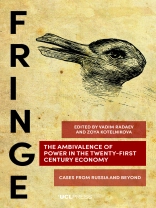The Ambivalence of Power in the Twenty-First Century Economy contributes to the understanding of the ambivalent nature of power, oscillating between conflict and cooperation, public and private, global and local, formal and informal, and does so from an empirical perspective. It offers a collection of country-based cases, as well as critically assesses the existing conceptions of power from a cross-disciplinary perspective.
The diverse analyses of power at the macro, meso or micro levels allow the volume to highlight the complexity of political economy in the twenty-first century. Each chapter addresses key elements of that political economy (from the ambivalence of the cases of former communist countries that do not conform with the grand narratives about democracy and markets, to the dual utility of new technologies such as face-recognition), thus providing mounting evidence for the centrality of an understanding of ambivalence in the analysis of power, especially in the modern state power-driven capitalism.
Anchored in economic sociology and political economy, this volume aims to make ‘visible’ the dimensions of power embedded in economic practices. The chapters are predominantly based on post-communist practices, but this divergent experience is relevant to comparative studies of how power and economy are interrelated.
Praise for The Ambivalence of Power in the Twenty-First Century Economy
‘An extraordinary innovation in the study of power that only a few (if any) had made before’
Laboratorium: Russian Review of Social Research
‘one of the most significant books published recently in the subject area of economic sociology.’
Siberian Socium
Tabella dei contenuti
Series Foreword
List of figures
List of tables
Contributors
Acknowledgements
Preface
Alena Ledeneva
1 Introduction
Zoya Kotelnikova and Vadim Radaev
Part 1: Interdependency of political power and economic governance: a macroperspective.
2 Interrelation between economic freedom and democracy: the case of post-communist countries
Marek Dabrowski
3 The pitfalls of rent-seeking: alternative mechanisms of resource rent collection in Russia and Venezuela
Aleksei Pobedonostsev
4 Contradictions of centralisation: four models of interaction between Russian rural communities and government and agribusiness
Alexander Nikulin and Alexander Kurakin
5 Legitimation of innovation: the case of AI technology for facial recognition
Leonid Kosals
Part II: Power struggles in the economy: an organizational perspective
6 Power of non-compliance: inter-firm opportunism in the Russian consumer markets
Vadim Radaev
7 Abusive supervision in organizations: power, dependency, and employee voice in labor relations
Evgeniya Balabanova
8 Beyond the state and digital platforms: (in)formalization of freelance contracting in Russia
Andrey Shevchuk and Denis Strebkov
9 Power struggles and quality construction in the market for municipal rental housing in Sweden
Elena Bogdanova
10 Private authority in regulating markets: power dynamics around Free Prior and Informed Consent (FPIC) in forestry and the oil industry in Russia
Maria Tysiachniouk, Sara Teitelbaum, Andrey Petrov and Leah Horowitz
11 Depriving counterfeiting of legitimacy: how brand holders enforced their intellectual property rights in Russia between the early 2000s and late 2010s
Zoya Kotelnikova
12 Academic excellence through homogenization? Gaining legitimacy from the strategic positioning of top ranked universities
Ivan Pavlyutkin and Anastasiia Makareva
13 One man’s pill is another man’s poison. Ambivalence of definitional power: the case of breast cancer drugs in Russia
Elena Berdysheva
14 ‘Russian Parmesan, even better than the original’: an exploratory research of organic farmers’ valuation strategies
Tamara Kusimova
Part 3: Resistance to domination and empowerment in the economy: an individual perspective
15 Everyday politics of consumption: why cynical consumers are disappointed citizens. The case of Moscow during the economic crisis of 2014−2017
Regina Resheteeva
16 Childbirth with doulas in Moscow: between empowerment and responsibility
Masha Denisova
17 Empowerment of the disempowered: assessing the impact of young Muscovites through ecological practices
Daria Lebedeva
Index
Circa l’autore
Zoya Kotelnikova is Associate Professor in Economic Sociology at the HSE University. She works on sociology of markets and consumption studies. Her publications include ‘Explaining Counterfeit Alcohol Purchases in Russia’ (2017) and ‘Recomposition and levelling of consumption expenditures across four economic shocks in Russia, 1994–2014’ (co-authored, 2017).












